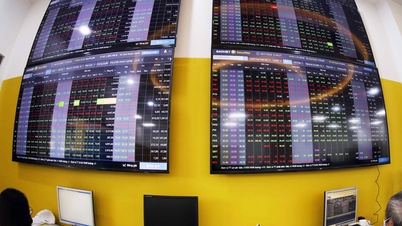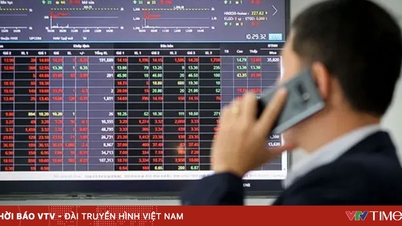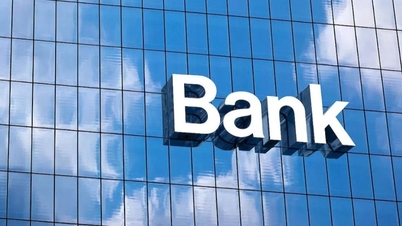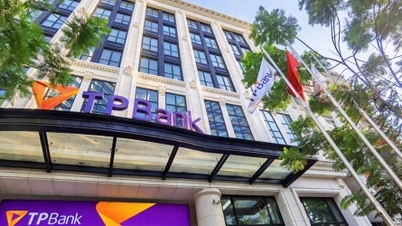 |
| High profit growth in the first half of the year has made bank stocks highly attractive to investors. Photo: Duc Thanh |
"King stocks" help VN-Index reach historical peak.
The VN-Index is continuously conquering historical highs. Along with securities and real estate stocks, bank stocks are leading the way, creating historical milestones for the VN-Index.
Since the beginning of the year, many bank stocks have increased by tens of percent, with some even doubling in value. Specifically, from the beginning of the year to the middle of this week,SHB (SHB Bank) stock increased by nearly 110%, ABB (ABBank) by 86%, VPB (VPBank) by 54%, TCB (Techcombank) by over 52%, STB (Sacombank) by 46%, EIB (Eximbank) by 44%, and so on.
In particular, in the past month alone, SHB's share price increased by nearly 36%, TPB ( TPBank )'s share price increased by 29%, and VPB's share price increased by 42%...
According to analysts, amidst record low interest rates, the government and the State Bank of Vietnam (SBV) are aggressively injecting money to support the economy , thus boosting bank stocks. Not only are they benefiting from loose monetary policy, but the banking sector is also receiving positive news related to bad debt recovery (legalizing the right to seize collateral), strong digitalization helping to reduce input costs, the removal of credit limits, foreign investor interest in bank stocks, and the prospect of an upgrade in September…
Associate Professor Dr. Nguyen Huu Huan, Head of the Financial Market Department (Faculty of Banking, University of Economics Ho Chi Minh City), commented that the acceleration of digital transformation in recent years has helped banks operate more efficiently, save costs, and increase their competitiveness.
Although the net interest margin (NIM) of banks has tended to narrow since the beginning of the year (due to pressure to lower lending interest rates to support businesses, while deposit interest rates have remained unchanged), strong credit growth has offset this decline. Therefore, bank profits in the first half of the year still showed very good growth.
Furthermore, the non-interest income segment of banks is very promising. Besides traditional services, the banking industry is facing opportunities to increase revenue from new services. In particular, the upcoming digital asset market opens up huge opportunities for banks and financial corporations. Many banks will focus on this new, unexplored "game." This promises to be a lucrative opportunity, offering attractive profits for participating banks.
Interest rates and cash flow will determine the attractiveness of bank stocks.
While bank stocks were considered attractive a few months ago, after rising by more than 28% in the past three months, their valuations are no longer considered cheap. According to analysts, overall, bank stock valuations are currently at a "moderate" level, and the attractiveness of these "king stocks" in the future will depend heavily on interest rate fluctuations.
Mr. Tran Ngoc Bau, General Director of WiGroup, believes that the stock is currently valued at a fairly average level. However, if interest rates rise again, the stock valuation will become expensive. In other words, when interest rates are low and money is abundant, stock prices remain attractive; conversely, when interest rates are higher and money is scarcer, stock prices will become expensive.
 According to Associate Professor Dr. Nguyen Huu Huan, Head of the Financial Markets Department (Faculty of Banking, University of Economics Ho Chi Minh City), the low interest rate environment is creating favorable conditions for banks to boost lending.
According to Associate Professor Dr. Nguyen Huu Huan, Head of the Financial Markets Department (Faculty of Banking, University of Economics Ho Chi Minh City), the low interest rate environment is creating favorable conditions for banks to boost lending.In particular, removing credit limits will open up many opportunities for banks, especially smaller banks. With the removal of credit limits, smaller banks could achieve 20-30% growth if they have the right strategies and policies. For larger banks, achieving strong growth after the removal of credit limits will be more difficult.

The government is directing the banking sector to stabilize interest rates and reduce costs to further lower lending rates. However, according to Mr. Tran Ngoc Bau, deposit interest rates are under pressure, partly due to high domestic credit demand and partly due to continued exchange rate pressure. In fact, many banks have recently had to use tools to attract deposits, indicating that capital flows are showing signs of scarcity.
Mr. Phan Le Thanh Long, General Director of AFA Group, commented that bank stocks are no longer as cheap as before, but the attractiveness of bank stocks in the future does not depend on valuation, but on cash flow.
According to this expert, during periods of market euphoria, stock prices are heavily dependent on investor sentiment and capital flow. Especially in a frontier market like Vietnam – where 80% of investors are individuals – investor sentiment is decisive. In other words, while bank stocks may no longer be attractive in terms of valuation, the market and this sector could still experience strong growth in the near future if capital continues to flow in.
Currently, the P/E and P/B ratios of the banking sector are both equivalent to the average levels over the past three years. The valuation of these "leading stocks" is not expensive, but it's no longer cheap either. Looking at low interest rates and loose monetary policy, with the target of double-digit growth in the coming period, many investors remain optimistic.
Mr. Phan Dung Khanh, Director of Investment Consulting at Maybank Investment Bank, believes that the inflow of capital into the market remains positive, making a deep correction as expected unlikely. The market trend is still upward, and any corrections, if they occur, will only be short-term, possibly lasting only a few trading sessions.
However, according to many experts, for the banking sector, most of the positive information has already been reflected in the price. Furthermore, investors should be wary of several risks in this sector, such as: potentially rising inflation, continued pressure on the exchange rate which may force the State Bank of Vietnam to halt interest rate cuts, and signs of increasing bad debt in the banking sector while the bad debt buffer is decreasing… Therefore, in addition to closely monitoring interest rates, exchange rates, and cash flows, experts recommend that investors exercise caution when using leverage at this stage.
Source: https://baodautu.vn/co-phieu-vua-co-hut-dong-tien-khi-dinh-gia-khong-con-re-d359432.html





































![[Photo] Prime Minister Pham Minh Chinh holds a phone call with the CEO of Russia's Rosatom Corporation.](/_next/image?url=https%3A%2F%2Fvphoto.vietnam.vn%2Fthumb%2F1200x675%2Fvietnam%2Fresource%2FIMAGE%2F2025%2F12%2F11%2F1765464552365_dsc-5295-jpg.webp&w=3840&q=75)










































































Comment (0)